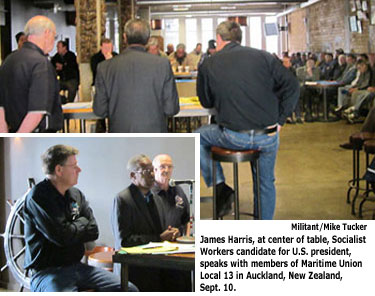

Vol. 76/No. 35 October 1, 2012

|
Harris was invited to speak by officials of Local 13 of the Maritime Union, which has been engaged in an eight-month contract fight with the Ports of Auckland.
“The slowdown in China has had an impact in this region,” Harris said. “In Australia nearly 9,000 jobs were lost last month. In New Zealand, miners are being laid off.
“The economic crisis of capitalism drives the rulers, from the U.S. to New Zealand, to press harder on working people as they compete against their rivals around the world, China chief among them,” he added. “That’s what is behind the U.S. role in the territorial disputes over small islands in the South China Sea, the recent trips to the region by Hillary Clinton and Leon Panetta, and the moves by Washington to militarily encircle China by deepening existing alliances in the Pacific and forging new ones.
“These moves are counter to the interests of working people—in the U.S. and throughout the entire Pacific from New Zealand to China,” Harris said.
The next day, Harris spoke to some 20 students at Auckland University, invited by members of “We Are The University,” a group campaigning against fee increases.
Harris traveled to Ngaruawahia Sept. 12 to speak to members of the Meat Workers Union from the AFFCO-owned beef plant at nearby Horotiu. Union members there fought a 12-week battle earlier this year, including against a lockout, and the company’s attempts to cut jobs and seniority, and undermine the union.
“I had heard of strikes before, but not lockouts,” said Simon McQueen, a boner and shop steward, and one of more than 40 mainly Maori workers attending. “Where do these come from, and when were they first used?”
“When we’re weak, they lock us out,” replied Harris. “In the U.S. now the union movement is at its weakest point in decades, and the employers feel emboldened. But they’ve been surprised by the resistance they’ve encountered. Given where we’re starting from, we may not win, but we let the bosses know that we will fight, and we learn.
“Movements come out of struggle, where working people gain awareness of ourselves and our capacities,” he said.
Sharryn Barton, a member of the Service and Food Workers Union, also attended the meeting and asked Harris to take a message of solidarity back to workers in the United States. “For us this is also a struggle of Maori people, the tangata whenua [indigenous people],” she said. She asked that Harris also take a message of solidarity to “the tangata whenua in the U.S.—Native Americans.”
“That is absolutely true,” Harris said. “Unions need to support broader struggles that working people are involved in—those of Maori workers, Black workers, immigrant workers, Native American workers. And think of the power you can unleash if you have the labor movement on your side.”
“The biggest lesson we learned during the lockout was that we couldn’t stand alone,” union president Don Arnold said, closing the meeting. “We had become insular, complacent and the bosses shook us up.”
Alison McCulloch, a journalist and a leader of the fight to defend women’s right to abortion, drove across the country to attend and interview Harris.
Workers at the meeting kicked in over $100 to help cover Harris’ air fare to New Zealand.
On Sept. 13, Harris met with six activists involved in a yearlong fight by state house tenants in Glen Innes, a working-class district of Auckland with a large Maori and Pacific Island population. Some 150 families are facing eviction from their low-rent homes by the sea to make way for the development of affluent private dwellings. “They don’t want us in their areas,” Aroha Robson told Harris.
“In the U.S. they talk about a housing crisis, but they mean something different than we do,” Harris said. “The rulers view housing, like health and education, as a commodity to make profits from. But for working people, these are needs. We want to stop things being commodities and make them the possessions of working people, because they are all a product of our labor.”
During his visit, Harris was interviewed by Chris Laidlaw for his Sept. 16 Sunday Morning program on Radio New Zealand, the country’s main nationwide public radio station.
Harris’ tour wrapped up at a Militant Labor Forum here Sept. 13 attended by 35 people, including eight young people and a dockworker coming to his first such meeting.
The forum began with greetings from Amanda Chase, a worker at Canterbury Meat Packers Rangitikei and shop steward for the Meat Workers Union. Chase was a leader of a nine-week fight last year against CMP’s attempts to impose deep cuts in wages and conditions at the plant.
“When you go back to work, the battle continues—it will never be over,” she said. “We lost our battle, but I personally won—I discovered who I was. Don’t be disappointed when you lose battles, because there will be plenty more and through our battles, our numbers will increase.”
Russell Mayn, secretary of Local 13 of the Maritime Union, also joined Harris on the panel.
Related articles:
SWP vice presidential candidate: ‘Legalize undocumented workers’
‘SWP important ally in fights by workers in Yakima Valley’
Front page (for this issue) |
Home |
Text-version home